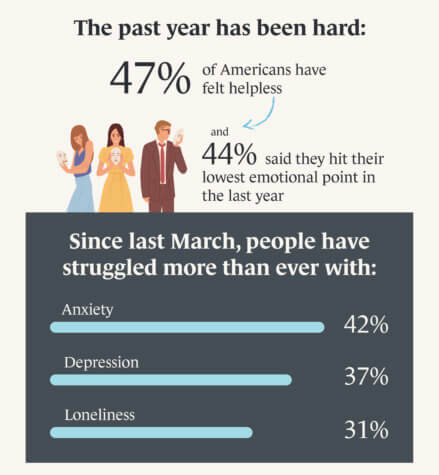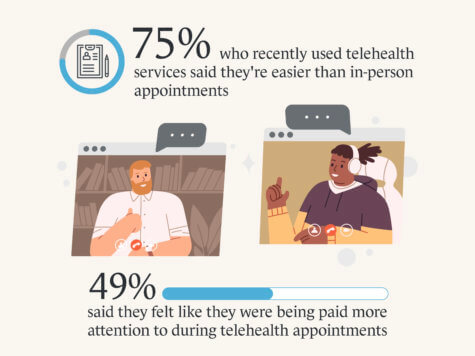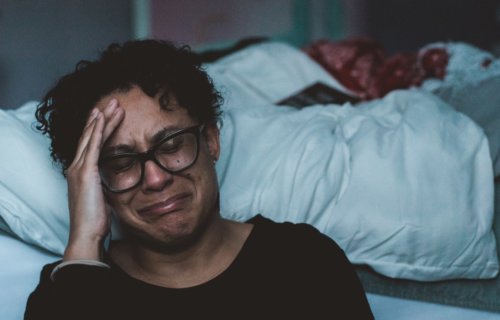NEW YORK — If there was a growing mental health crisis before 2020, a new study finds the coronavirus pandemic may have sent it spiraling out of control. Half of Americans feel they lost complete control of their lives during the last year.
A survey of 2,000 people reveals 47 percent feel helpless, while 44 percent say they hit their lowest emotional point within the last year. Since last March, Americans report struggling more with anxiety (42%), depression (37%), and loneliness (31%) than ever before.
 While 72 percent agree mental health care is just as important as physical health care, only 18 percent are currently enrolled in therapy sessions. Forty-six percent of those seeking help struggle to find a therapist to help them. Another 54 percent say they’ve struggled to find one that truly understands them.
While 72 percent agree mental health care is just as important as physical health care, only 18 percent are currently enrolled in therapy sessions. Forty-six percent of those seeking help struggle to find a therapist to help them. Another 54 percent say they’ve struggled to find one that truly understands them.
Another major hurdle includes finding a health care provider for their physical health. Other problems range from finding a doctor covered by insurance (32%), finding someone they can afford (24%), and finding a doctor that’s easy to get a hold of or commute to (23%).
Nearly half of adults agree that doctors actually listen to them more during telehealth visits
Commissioned by Monarch and conducted by OnePoll, the study finds the pandemic has helped improve how Americans are seeking help through telehealth appointments. One in three Americans (35%) say they’ve used telehealth services before, and three-quarters of that group used it for the first time over the past year.
Overall, three in four respondents who have recently used telehealth appointments believe it’s easier than in-person checkups. Nearly half the poll (49%) claim their doctor paid more attention to their health concerns. Forty-eight percent say telehealth appointments have been so effective they plan to continue using the service for all of their health needs after COVID. Americans are mainly using telehealth appointments to see general practitioners (60%), specialized physicians (35%), and therapists (29%).
“There’s no question that this year put unprecedented strain on everyone,” says Monarch co-founder and Chief Research Officer Ralph Zimmermann in a statement. “For many, the isolation of the pandemic also meant that access to medical care — of which mental health is an important part — was limited when we needed it most. If you’re feeling low, and can’t get help, you’re only going to feel even lower.”
Pandemic changed perspective of mental health awareness
 Six in 10 people credit the pandemic for changing how they view the importance of mental and physical health. More than half (56%) add they now pay closer attention to their mental health than they did before the pandemic. COVID-19 is also making finding a doctor somewhat easier. Thirty percent believe it’s been much easier now to find an appointment that works with their schedule during the pandemic.
Six in 10 people credit the pandemic for changing how they view the importance of mental and physical health. More than half (56%) add they now pay closer attention to their mental health than they did before the pandemic. COVID-19 is also making finding a doctor somewhat easier. Thirty percent believe it’s been much easier now to find an appointment that works with their schedule during the pandemic.
Fifty-seven percent of Americans in therapy feel recent changes in technology is making it easier to get professional mental health help nowadays. Almost as many (53%) think telehealth specifically is making therapy easier and more effective.
“While it’s not likely that telehealth will completely replace all of the benefits of meeting with a therapist in person, there are ways that technology will only continue to improve access to therapy and even to better match people in need with the therapist best suited to their specific health issue, location, scheduling, and payment preferences,” Zimmermann adds.
